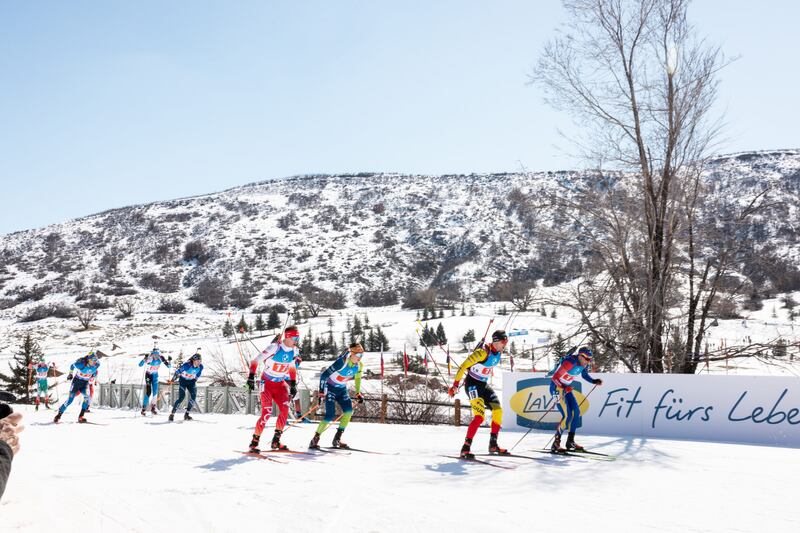This story appears in the September issue of Utah Business. Subscribe.
Editor’s Note: A previous version of this story incorrectly stated that the Sochi Winter Olympic Games occurred in 2012. The Sochi Winter Olympic Games occurred in 2014.
Staffing the 2014 Winter Olympic Games in Sochi, Russia, was the most difficult human resource problem of Dan Merkley’s career.
“For starters, we couldn’t find housing for people after recruiting them from all over Russia,” says Merkley, a large-scale sporting event consultant who has managed six Olympic Villages. “Once we solved the headcount problem, the bottleneck became beds. We’d run out and have to freeze recruiting until we found more. Meanwhile, the clock is ticking. … It was exhausting.”
Heading into any Olympic Games, attention tends to focus on the readiness of the host city’s physical infrastructure, and the story of meeting the enormous human infrastructure requirement is relegated to the sidebar. But when it comes to hosting the Games successfully, solving human infrastructure problems can be just as vital as solving the physical ones.
This is one of several reasons why the International Olympic Committee (IOC) handed Salt Lake City the 2034 Winter Games.
Small Lake City
“We’re unusually blessed with a large population base within a very compact Games footprint, and that puts us miles ahead of any other potential Winter Games host,” says Darren Hughes, who served as director of human resources for the 2002 Winter Olympics in Salt Lake City.
Hughes says that having all of the venues for the 2034 Games within an hour of downtown means there is no need to import workers or hustle to find lodging for them. This, in turn, yields more efficient and thus less expensive operations.
When venues are distant enough to make commuting impractical, one solution is to divide the Olympic Village among venues rather than keep athletes at a single, centralized location — as was the case in Sochi. But that solution brings with it additional problems.
“When there’s duplication, you have to recruit even more people to meet minimum staffing thresholds at each venue cluster. It’s extremely inefficient and applies more staffing pressure and uncertainty,” Merkley says.

Hidden hurdles
On the surface, hosting the Summer Olympics seems more difficult than hosting the Winter Games. At the recent summer games in Paris, the number of athletes, sports represented, medal events and venues was about four times that of Salt Lake City’s in 2002. With respect to ticket sales, Paris bested Salt Lake City by about sevenfold.
However, those numbers hide a set of challenges confronting Winter Games organizers that their warm-weather counterparts will likely never have to face.
Summer Games are held in major metropolitan areas, with most venues within walking distance of the Medals Plaza, surrounded by bountiful accommodations and many locals. By contrast, many Winter Games venues are situated hours away in mountain villages with relatively few accommodations and even fewer residents, accessible by narrow, winding roads prone to being rendered impassable by winter storms.
For each Winter Olympics athlete, there are about 20 employees, contractors and volunteers working behind the scenes. That’s usually well over 50,000 people who need someplace to stay for between three weeks and two years, while still leaving rooms available for hundreds of thousands of visitors.
“The IOC has been desperate to find a host city able to deliver a successful Games with no surprises and have a very shallow learning curve on how to navigate that collaboration. They all know that when working with Salt Lake, there will be no surprises,” Merkley says.
Meeting niche skill demands
Michael Jaquet, former CMO at U.S. Ski & Snowboard, is an expert at sporting event video production. He says the number of people with the highly specialized knowledge needed to produce and broadcast an event as vast and complex as the Olympics is surprisingly small, and it is one of many jobs any typical host city would have to import.
“Utah has just the right amount of people — who have successfully presented these kinds of events on television at a world-class level — to staff the games without importing any video production staff,” Jaquet says. “No other host city can do that, except maybe Los Angeles in 2028, with its large base of television production talent.”
Jaquet adds that while Los Angeles may have the video production component covered, the combined talents of its residents still will not be enough to complete the job.
“Even with their thriving business community and population, so much has changed since Los Angeles hosted in 1984 that putting together the right team to execute in 2028 will require bringing a lot of people in. That will make it all much more expensive,” Jaquet continues.
Though a fair amount of time will have passed since the Games were last hosted here, Jaquet believes the process of setting Salt Lake City up for success in 2002 has set the stage for an even bigger success in 2034.
“This used to be a completely different place,” he says. “Leading up to 2002, the organizers had to bring in people who worked on the Games in Australia and Atlanta to be venue operators, transportation consultants and all the other jobs nobody knew how to do. They meant to move here for a year or two, but many never left.”
Jaquet adds that the long list of high-profile sporting events hosted here since 2002 is, in part, a consequence of Salt Lake City’s world-class venues and the critical mass of skilled technicians being noticed.
The Games have grown significantly since 2002, Hughes says, pointing out that technology has advanced exponentially as well. “The ability to work with and integrate these platforms is a vital talent we will be looking for,” he continues. “We have the advantage of one out of every seven Utah jobs being tech-related.”

Utah’s intangible advantages
Another advantage Utah brings to the table — one that can neither be purchased nor engineered — is culture.
“It takes a certain kind of person to spend the day standing on a mountain in sub-zero temperatures with the wind blowing in your face,” Jaquet says. “In Utah, we grow up that way. We’ve built an entire lifestyle and a community around it. No other potential host city has that because their mountains are so remote.”
If you are a long-time Utahn, it will likely come as a surprise that the citizens of many places have no interest in hosting the Olympics. This is primarily due to concerns over the cost to taxpayers and the brief but substantial disruption to daily life the Games bring. However, a survey included in the IOC’s 2034 bid feasibility study showed that 80 percent of Utahns are in favor of hosting in 2034, with just four percent opposed. Given the poll’s 3.8 percent margin of error, there is close to no opposition. (Try finding another public issue inspiring that level of unanimity these days.)
“Utah has the highest rate of volunteerism and charitable giving. We knew that the state was excited to host, but we’d never done this, and we didn’t know how that energy would translate,” Salt Lake County Mayor Jenny Wilson says, reflecting on her time as one of the directors in charge of the 2002 volunteer effort. “In the end, we had over 60,000 applications for 25,000 spots, and our problem became more about how to choose.”
Utah’s high rate of bilingualism is driven by a missionary culture that sends young adults all over the world. In turn, they’ve become fluent in just about every language on earth — a skill that is crucial for Games volunteers.
“When hosting the world, you have a lot of language barriers,” Wilson explains. “Part of the volunteer application asked if they spoke other languages. Luckily, we had a lot of returned missionaries able to easily cover that need.”
Nothing fails like success
To whoever lands her old job in 2034, Wilson warns against complacency.
“I would tell that person they can’t assume conditions and people’s lives will be similar to when we started recruiting volunteers back in 2000,” Wilson says. “I’ve noticed a shift in the level of activity of my campaign volunteers, especially since COVID-19, when it became harder for people to take time off. My friends in the nonprofit world are seeing the same thing.”
Hughes, who is expected to oversee human resources at the 2034 Games, is aware of the danger of making assumptions based on a single data point, no matter how successful it may have been.
“It’s become a much tighter labor market now, and wages are way up. It will be harder for us to be competitive when the time comes to hire the needed 1,500-1,800 full-time staff, plus 2,000-3,000 temporary roles and 25,000 volunteers,” Hughes says. “Figuring out how to pull those people away from their careers for 18 months or 18 days and compensate them fairly as a nonprofit that does not offer stock options or bonuses is something that keeps me up at night.”
Though cautious in her optimism, Wilson says she monitors a reliable indicator that Utah’s volunteer culture remains strong and is getting stronger.
“Utah has hosted thousands of international sporting events since the Games, and they use a volunteer structure at the venues similar to the one we used. We’ve seen that those structures are thriving and becoming more robust,” Wilson says. “Still, we can’t just assume we’re going to be able to continue doing things the same way and get the same response.”
One thing is certain: As eager to reprise 2002 as the people of Utah are, Jaquet says the IOC seems just as eager to give it to us.
“The IOC has a lot to be happy about when awarding the Games to Salt Lake City,” he says. “They like that billions of dollars won’t be spent cutting down ancient forests and building new venues that will be abandoned in 10 years just so a dictator can show off their strong economy. But it’s impossible to overstate the importance they place on having the right people already in place, with the capability to execute the Games, turnkey. No other city can replicate that. And it’s made a huge difference.”

